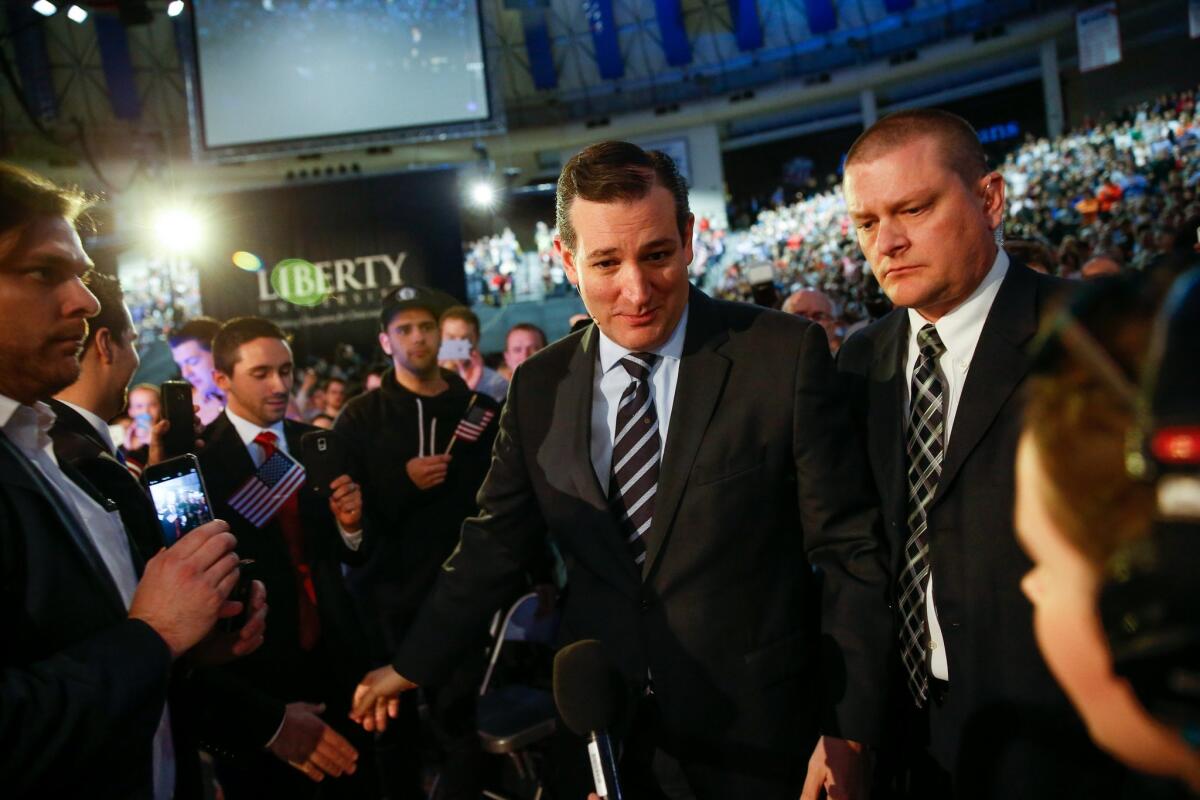Why Ted Cruz is running for president now and 5 other things to know

Texas Sen. Ted Cruz became the first candidate to officially jump into the 2016 presidential race and will likely be one of nearly a dozen candidates vying for the Republican nomination. Here’s some information on the Texan who has served in the Senate since being elected in 2012:
Why did Cruz decide to jump into the presidential race now?
A mix of bad poll numbers and the fact that prospective candidates like Gov. Scott Walker of Wisconsin and former Florida Gov. Jeb Bush are receiving widespread media attention made this an opportune time to enter the race. In most polls, Cruz is trailing the likely pack of candidates by double digits. By announcing his candidacy, Cruz can now begin to raise cash for his campaign and hopes to rake in between $40- and $50 million. If no one else formally declares before April 1, then Cruz will be the only presidential candidate to file a campaign finance report with the Federal Election Commission next month.
What has Cruz done in Washington?
In his short time on Capitol Hill, his most notable accomplishment was a 2013 filibuster on the Senate floor in an effort to repeal President Obama’s healthcare law. His staunch opposition to the Affordable Care Act helped lead to the 16-day government shutdown, which propelled him to become a leading voice among far-right conservatives. In the Senate, however, he’s not well received among Democrats and establishment Republicans and is a bit of an outcast. Sen. John McCain (R-Ariz.), the party’s presidential nominee in 2008, notably called Cruz and Sen. Rand Paul (R-Ky.) “wacko birds” for their outspokenness on Capitol Hill.
What did Cruz do before he arrived in Washington?
After graduating from Harvard Law School in 1995 he worked in private practice for a few years in Texas before entering politics where he worked as a policy advisor on President George W. Bush’s 2000 presidential campaign. Shortly after Bush’s victory he was appointed Texas solicitor general by then-state Atty. Gen. Greg Abbott. He served in that role from 2003 until 2008 and went back into private law practice before he ran for Senate.
Who are Cruz’s ardent supporters?
Social conservatives and members of the tea party coalesced around Cruz’s 2012 Senate bid. This core constituency helped separate and propel him to victory in a crowded primary in Texas’ Senate contest. And now Cruz hopes these same voters will help him in states from Iowa to South Carolina, which vote early in the presidential primary. Liberty University, the backdrop of Cruz’s announcement on Monday, is a play for evangelical voters, who are a key voting bloc in GOP presidential primaries. The school also offers a vast donor network that could help elevate his candidacy.
The 2013 government shutdown hurt the image of the Republican party overall, but it helped Cruz, at least among his core supporters. Among Republicans who identify with the tea party, Cruz became much better known during the shutdown fight, and the percentage with a favorable view of him soared, according to polls by the nonpartisan Pew Research Center. During the summer of 2013, just under half of tea party Republicans had a favorable view of Cruz, but more than four-in-ten didn’t know enough about him to hold an opinion, Pew’s polling showed. But by mid-October of that year, during the midst of the shutdown, more than 80% of tea party Republicans knew who he was, and almost all of them viewed him favorably. Among Republicans who did not see themselves as part of the tea party movement, however, Cruz became a little better known and significantly less popular. Views of him among non-tea party Republicans shifted from 26% favorable and 16% unfavorable before the shutdown to 25%-31% in October 2013.
Can Ted Cruz run for president since he was born in Canada?
Although Cruz grew up in Texas he was born in Calgary. His mother was born in the United States and his father in Cuba and both were working in the oil industry at the time of his birth. Because his mother is an American, Cruz has U.S. citizenship. In 2013, Cruz renounced his Canadian citizenship. Within the U.S. Constitution it notes that candidates for president must be “natural-born citizens.” Though that is open to interpretation because it’s never been tested by the Supreme Court. In 2008, McCain faced a similar issue but argued that his birthplace, the Panama Canal Zone, was U.S. territory at the time he was born. The Senate passed a bipartisan resolution endorsing his eligibility.
Why is Cruz a long-shot candidate?
Cruz has no support from establishment wings of the party, which have strong influence when it comes to fundraising and organizing on the ground in early primary and swing states in a general elections. As he courts far-right voters by touting opposition to issues like same-sex marriage and certain immigration reforms he could alienate moderate Republican voters.
On Monday morning Cruz tweeted his campaign announcement
Get the L.A. Times Politics newsletter
Deeply reported insights into legislation, politics and policy from Sacramento, Washington and beyond. In your inbox three times per week.
You may occasionally receive promotional content from the Los Angeles Times.








